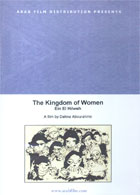
The Kingdom of Women 2010
Distributed by Arab Film Distribution, 10035 35th Ave. NE, Seattle, WA 98125; 206-322-0882
Produced by Arab Resource Center for Popular Arts, Al-Jana
Directed by Dahna Abourahme
DVD, color, 54 min.
Jr. High - General Adult
Palestine, Women’s Studies, Lebanon, Israeli Invasion of Lebanon 1982, Israel, Middle East, Women’s Rights, Human Rights, Activism, Social Movement
Date Entered: 06/04/2012
Reviewed by Malcolm L. Rigsby, Department of Sociology and Human Services, Henderson State University, Arkadelphia, ArkansasThis is not your typical documentary. It is a story, or perhaps you may call it a series of stories. With the opening scenes, we quickly visualize the events that took place in spring 1982 following the invasion of southern Lebanon by the Israeli forces. In the wake of the invasion all the men of the village of Ein El Hilweh are rounded up. As described, all men between 14 and 60 years were ordered to gather together and then taken to prison. Women and children were left to fend for themselves. Many mothers with infants were left to care for families in the war torn environment.
The film interposes discussion with several of the women who played key roles in reestablishing the camp of Ein El Hilweh after the 1982 destruction. We learn of their trials, tears, and celebrations. The director, Dahna Abourahme, cleverly uses black and white animation and stills along with thought provoking narration to paint a deeply meaningful portrait of the course these surviving women, children, and the elderly took in order to show the world that they would not give up. It is through the thoughtful stories of these women that we are enabled to see what true heroes are. They are not necessarily fearless; though they are always persistent and work as part of a team. One scene is particularly telling of the sense of optimism these women share. As she stands by an old battle scarred tree, with one hand outstretched upon its trunk, she says, “I have beautiful memories of this tree. My father tells me this tree was here when he first arrived from Palestine in 1948. It bore small cones that we made into necklaces. This tree has witnessed a world war and the Israeli invasion of 1982. When we stood in the entrance to the camp, all we saw were these two trees. Everything else was rubble. Then the Israelis bulldozed all the houses, people’s photographs and documents; all that was gone.” It is clear that like those trees she and the people of Ein El Hilweh are survivors.
Left alone the women were lost, not knowing where to turn or where to go. They wandered about the destroyed camp. Finally, they stopped, made a fire and made bread. Filled with doubt the women tried to eke out a way to survive. Over the next few weeks, seven women began to come together and discuss options for survival. One woman says, “We woke up from our nightmare and everything was gone.” All that was left was to be creative and give of themselves, both their time and health, as one says. Of the many stories, one particular one is quite illustrative of the creativity these women used in order to return their lives to normal. One woman’s father had an old taxi that was beaten up and non-functional. With all the buildings destroyed and what materials that existed being used for shelter she turned the taxi into a roadside fruit stand. There she sold eggplants, potatoes, mloukhiyeh, and plums. As her son says, “people started buying from us and we survived.”
Such behavior of women might not sound so unusual for westerners. However, in the Palestinian culture this was not the norm. Women were expected to handle domestic affairs not set up businesses as entrepreneurs, set up schools, and act as journalists. Nevertheless, as one woman states, “Who else was there to do it?” It was rewarding. However, this drive to invent ways to live was not enough. Confronted with relocating and living in tents, the women unite and protest the Israeli plan. When authorities confront them, they organize a campaign and sabotage the tent city, destroying it. The tent plan ended. One by one the women, joined by the village, rebuilt each home block by block, stone by stone until emerged a “kingdom of women,” built by women!
This is a story of courage, persistence, and unity. It should inspire and uplift the ability of humankind under oppression and hardship. Whichever of these women may inspire you, one thing is certain—that each will inspire activism. Today these women are still touching the lives of a younger generation inspiring them to find life in the midst of struggle.
This is an excellent film with top quality photography and sound. Subtitles are well timed and graphically visual in each scene. The only criticism I have for the film is that it does need to have a chapter menu for review and group discussion. Also, see the Al-Jana.org YouTube Channel or The Museum of Fine Arts, Houston web site for video clips.